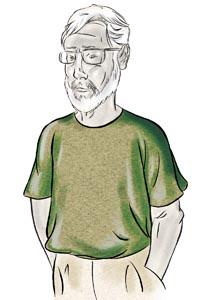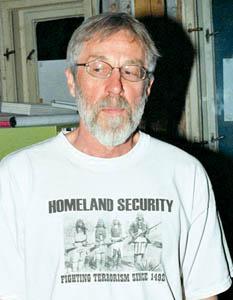Sena Christian & Jed Alexander
Radical rethinking
SN&R connected with Eugene, Oregon-based green anarchist John Zerzan for his take on modern society and mainstream environmentalism. Zerzan is a preeminent writer on anti-civilization, anarchist theory. He serves on the editorial collective of Green Anarchy, a biannual journal, and travels the world speaking with others committed to breaking down all forms of domination and moving toward a radically decentralized existence in the quest for liberation and freedom.

In terms of ecological defense, why is civilization the enemy?
You’ve got to go back that far to see the roots of the present crisis. Go back to domestication. As the late author Paul Shepard said, we’re talking about things like nanotechnology and genetic engineering and cloning that begins with agriculture. It’s implicit in the first step. Worsening environmental degradation stems from that shift to control—the domesticating move where nature becomes an object to be manipulated and dominated. So that’s getting back to a fundamental, primary motor. Oswald Spengler, a person of the right, a rather horrid person I would say, said civilization means ultimately nature’s a graveyard because it just marches forward. Or as German philosopher Martin Heidegger put it, all of nature is just the raw material for technology; it’s something to be used up. If you’re not looking at the mainspring, you’re only operating on the surface.
Is this why green anarchists criticize technology?
Technology, a lot of which is clean and shiny and looks nice on the shelf has, you might say, blood on it. It comes from the systematic use of nature as the raw materials for technology. Technology doesn’t fall from the skies. It comes from the existence of mines and smelters and assembly lines. The dominant idea the system gives us is, yes, there’s a crisis, but technology will come up with a solution. We see it as part of the problem. Technology keeps creating the problem, and then it comes around to say more technology will be the answer. We think that’s a false claim.
Should we just throw out mainstream environmentalism completely, or is there anything about it that works?
Mainstream environmentalism does not approach the problem with any depth. You’ve got Sierra Club’s Sierra magazine, the back cover is always Toyota advertisements. That’s really unbelievable. You can’t be environmentalists, in our view anyway, and say big auto companies are just great. That doesn’t make sense. We feel there are a lot of very sincere, well-meaning people in the mainstream environmental milieu. But we’re not going to get anywhere unless we use a different model instead of just hoping we’ll patch up this one. Just let it go. Al Gore says change your light bulbs, but that’s ridiculous. Even if everyone did everything he said, it would be a minor part. It’s not so much an individual, consumer choice as it is a much deeper institutional choice. Do you want a world of mass production, which devours everything and just hope for the best somehow when you can see it’s only getting worse, or do you want to try some different way?

How does green anarchy move beyond a human-centered outlook and lifestyle to a biocentric one?
Well, that’s the whole thing. How do we break our dependency on all these domesticated features that we’ve become accustomed to? When we talk about reconnecting with the Earth, that’s a practical challenge: How do you do that in a real way and not just in terms of ideas of critiques? And that’s a matter of looking to what techniques and tools we can use. For example, with food, there are people working with permaculture: What do they eat? What is their relationship to the actual landscape? These people are moving away from domestication. People ask what do green anarchists offer cities?—and nothing, in a sense, because ultimately we don’t think cities are tenable. I just came back from Istanbul, and you’re looking at 15 million people living in tower blocks. They’re going to be dead in about two days if the whole system crashes. We’ve got to start this movement outside or away from these artificial situations where people have no autonomy, no skills to feed themselves.
Does that relate to the anarchist idea of “primitive-future?”
If we’re going to have a future, it’ll have to be primitive to stop destroying the Earth, some kind of return to community. I’ve been writing about social dislocation and what’s been happening with society as much as with the environment, because I think that gets at the core. What we are now seeing in the most developed, most technological countries, such as this one, are these mass shootings—school shootings, mall shootings—this is really scary, this is really pathological. It’s what you get when society becomes technology and not much else. It becomes empty and meaningless and desolate and you start having people that are so nihilistic they don’t even care about life anymore. I don’t think it’s just outer nature, I think it’s our inner nature too that is having such a bad time. I’ve got grandkids, and I wonder what kind of world they’re going to live in. What have we become?
Do you find hope in any of this?
In a strange way, I’m optimistic because I think there can be a wonderful change—a big shift that’s going to come because the system doesn’t have any answers, and we can see there’s no future sticking with this, so there’s a good chance for people to get together and figure out something better.
Anarchists promote direct action over mediated or symbolic forms of resistance. What are some actions you encourage?
I’m not averse to saying I think direct action is a good thing. Damage to property, not violence against people. Things in the streets, like in Seattle in 1999, really got people’s attention. The Earth Liberation Front, when they commit arson, it draws people’s attention to just how bad it’s getting and to take up arms—and I don’t mean against people. They’ve never injured anyone—and go after these targets. We literally mean direct action, and we’ve got friends in prison because of it. Like the war [protests], there are a lot of good people in the streets but it hasn’t meant anything, the killing goes on. Maybe you’ve got to do something more than that. Maybe you’ve got to start blocking the streets. Personally, I would say it’s a dialogue in society; if that gets going, there’s huge potential. And self-sufficiency makes people stronger. If you’re vulnerable, you can’t oppose things very well, you can’t stick your neck out so far. If we’re better situated, we can be a more vigorous voice.
What is meant by a green anarchy revolution?
We don’t really use the word ‘revolution’ because we feel that’s an outdated model that hasn’t worked. But I know what you mean—what would be the turning point or big social momentum? I think that would be a critical questioning of everything and removing the things that cause the problems. So this is not a political revolution really, but a much deeper one.
